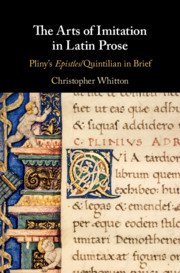Book contents
- The Arts of Imitation in Latin Prose
- The Arts of Imitation in Latin Prose
- Copyright page
- Dedication
- Epigraph
- Frontispiece
- Contents
- Ad lectorem
- Quintilian in Brief, in Brief
- Abbreviations
- Chapter 1 Two Scenes from the Life of an Artist
- Chapter 2 Setting the Stage
- Chapter 3 Brief Encounters
- Chapter 4 Dancing with Dialectic
- Chapter 5 Through the Looking-Glass
- Chapter 6 On Length, in Brief (Ep. 1.20)
- Chapter 7 Letters to Lupercus
- Chapter 8 Studiorum secessus (Ep. 7.9)
- Chapter 9 Docendo discitur
- Chapter 10 Reflections of an Author
- Chapter 11 Quintilian, Pliny, Tacitus
- Chapter 12 Beginnings
- References
- Index locorum
- Index of Greek and Latin Words
- General Index
Chapter 10 - Reflections of an Author
Published online by Cambridge University Press: 10 June 2019
- The Arts of Imitation in Latin Prose
- The Arts of Imitation in Latin Prose
- Copyright page
- Dedication
- Epigraph
- Frontispiece
- Contents
- Ad lectorem
- Quintilian in Brief, in Brief
- Abbreviations
- Chapter 1 Two Scenes from the Life of an Artist
- Chapter 2 Setting the Stage
- Chapter 3 Brief Encounters
- Chapter 4 Dancing with Dialectic
- Chapter 5 Through the Looking-Glass
- Chapter 6 On Length, in Brief (Ep. 1.20)
- Chapter 7 Letters to Lupercus
- Chapter 8 Studiorum secessus (Ep. 7.9)
- Chapter 9 Docendo discitur
- Chapter 10 Reflections of an Author
- Chapter 11 Quintilian, Pliny, Tacitus
- Chapter 12 Beginnings
- References
- Index locorum
- Index of Greek and Latin Words
- General Index
Summary
Chapter 10 pursues Pliny’s project of Quintilianic ethopoeia further, showing how – against all expectations – the most intimate passages of the Institutio are integrated into his collection. We begin with Quintilian’s two ‘inner prefaces’, on his imperial appointment (Institutio 4.pr.) and the deaths of his wife and sons (Institutio 6.pr.): Pliny reworks the first in Epistles 2.9 (senatorial electioneering) and 8.4 (Rufus’ epic Dacian war), the second in Epistles 5.16 (laments for Minicia Marcella) – two remarkable transformations which also raise macrostructural questions about Pliny’s grand designs. The rest of the chapter is devoted to another touching moment, Quintilian’s closing reflections on the orator’s retirement (Institutio 12.11). A divided imitation across Epistles 3.1 and 9.3 – by way of an excursus on Pliny the Elder in Epistles 3.5 – takes us deep into the textualisation of life, death and posterity.
Keywords
- Type
- Chapter
- Information
- The Arts of Imitation in Latin ProsePliny's <I>Epistles</I>/Quintilian in Brief, pp. 353 - 406Publisher: Cambridge University PressPrint publication year: 2019

